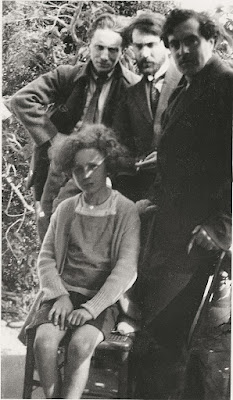Sophokles/Holderin 'Antigone'
Sophokles/Hölderlin 'Antigone'
Paul Murphy, Munich
Last night I went to see ‘Antigone’ at the Glyptothek in Königsplatz, München, in the translation of Hölderlin from Sophokles.
A very bad ensemble performance. The cast were dressed in (what they supposed to be) the garb of ancient Thebes, faces daubed with white paint, a bit like the black and white minstrel show in reverse. There was much running about, movement of a non-balletic kind, whistling, Creon reeling off speech after speech. In fact Creon (Ronnie Janot) was the only actor of any real substance, quite clearly holding the whole thing together while the rest of the cast went through the motions of acting, sometimes in a complete, inadvertently hilarious manner. Although the German of Hölderlin was impenetrable to me (Hölderlin was in the throes of schizophrenia when he made the translation, probably spending his days at the local bedlam in manacles or receiving cold water therapy, a popular cure for ‘madness’ of the time.) and possibly impenetrable to everyone, even to those who spoke fluent Bayerisch or HochDeutsch, since Hölderlin´s German is so archaic, peppered with obscure references to the Classics, written at a time when the consciousness of Hölderlin was fractured.
The real problem with the play was the production values or the complete absence of thought about context and performance. Why not try to update this classic to the contemporary world? The use of anachronism might have been interesting, even members of the cast wearing wrist watches to foreground the play as a play in and out of history. The theme of the play (Creon´s refusal to allow Antigone´s and Ismene´s brother Polynices rites of burial, something that went against the grain of Greek society.) could easily be connected to any number of contemporary events. Apparantly there are more than sixty different translations of the play, by Brecht, Jean Anouilh and many others. Hölderlin was writing in the aftermath of the French Revolution, at the beginnings of the era of mass society, a time quite remote to Sophocles and the events depicted in the play. The importance of the play is in the way in which it helps the contemporary audience to connect to the political events that are happening at the time not in re-imagining the play in the context of Sophocles and then failing to refract it through the lens of Hölderlin´s era too. The production fitted in very nicely with the context of the Glyptothek, however, but this reviewer cannot help but feel that Sophocles´ statuette was frowning or glowering broadly (or falling from its plinth, the long dead playwright experiencing a posthumous cardiac arrest).
On the way to the Glyptothek that evening I spotted a figure, doubled up, seemingly drunk on the grass in front of the Lenbach Haus. The next morning the area was cordoned off, a corpse was plainly visible. This man that I had spotted the evening before died in the interaction time between the beginning of the play and nightfall which all goes to show how futile the drama had been, how I had failed to act to do anything. The scene gave me a kind of vertigo but I walked on and on.

Comments